FIDE World Cup 2025 heads to Goa, India
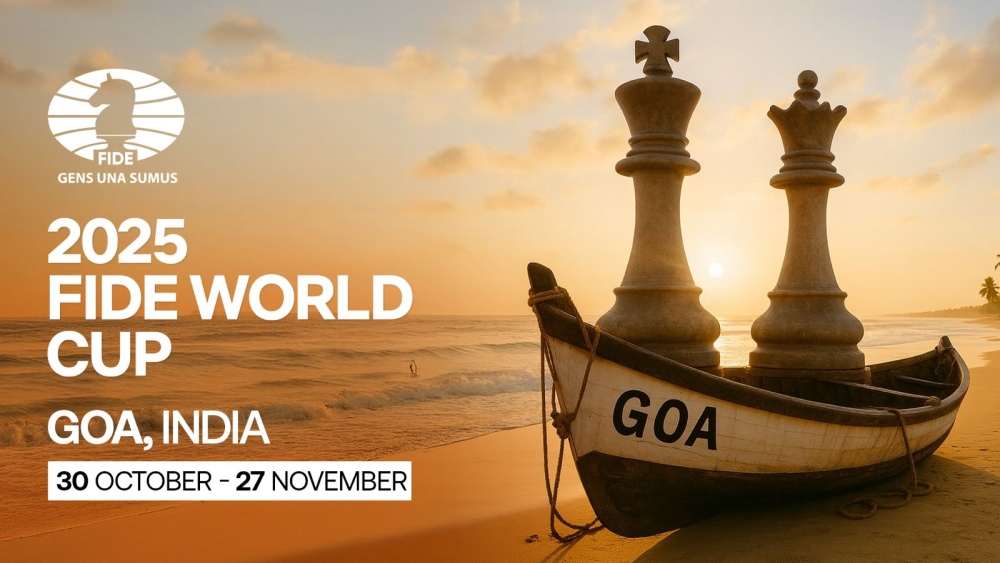
The FIDE World Cup 2025 is coming to Goa! From October 30 to November 27, 2025, the world’s top players will gather on India’s west coast for one of the most exciting chess events. This knockout spectacle brings together 206 players fighting for a share of USD 2,000,000 and three coveted places in the 2026 Candidates Tournament. Every round is win-or-go-home, making the World Cup one of the most dramatic tournaments on the calendar. Why Goa? Goa’s stunning beaches, vibrant culture, and warm hospitality makes it an exciting backdrop for this global showdown. Players and fans will experience world-class chess alongside a destination famous for its energy and charm. India’s connection to chess runs deep, and in recent years the country has become a global force, producing top players and hosting significant tournaments. Last year, Gukesh Dommaraju became the World Champion, whilst Indian teams won the Chess Olympiad in both Open and Women categories. The momentum continued: this July, the Women’s World Cup saw a standout performance by Divya Deshmukh, who lifted the trophy and captured worldwide attention. Staging the Open World Cup in Goa builds on these successes and gives local fans an opportunity to watch their stars compete against the very best on home soil. Arkady Dvorkovich, FIDE President: “India has become one of the strongest chess nations, with outstanding players and passionate fans. After the success of the FIDE Women’s World Cup held in Georgia earlier this year, we are proud to bring the FIDE World Cup to Goa. It will be a celebration of chess, and a unique experience for players and spectators from around the world. The representatives of 90+ countries are expected to take part, and it will be one of the most followed events in chess history.” Narendra Modi, Prime Minister of India: “India is delighted to be hosting the prestigious FIDE World Cup 2025 and that too after over two decades. Chess is gaining popularity among our youth. I am sure this tournament will witness thrilling matches and showcase the brilliance of top players from around the world.” Nitin Narang, AICF President: “This is a proud moment for Indian chess, and we are committed to delivering an event that reflects both the passion of our fans and the professionalism of our federation. The World Cup will not only inspire millions across the country but also showcase India’s growing stature as a global hub for chess. We are deeply thankful to FIDE for granting India the honor of hosting the World Cup 2025 in Goa.” Key Details Dates: 31 October to 27 November 2025 Venue: Goa, India Players: 206 Format: Eight-round knockout Top 50 seeds enter from Round 2 Matches are two classical games, with rapid and blitz playoffs if tied Candidates spots: Top three finishers qualify for the 2026 Candidates Tournament List of qualified players: worldcup2025.fide.com/participants/ Regulations for FIDE World Cup 2025 (PDF) With Goa confirmed as the host city, anticipation is building for an unforgettable month of high-stakes chess. Stay tuned for more information. The countdown to the FIDE World Cup 2025 has officially begun!
Women’s Chess Marathon – Week 3: Asia and Australia сelebrate
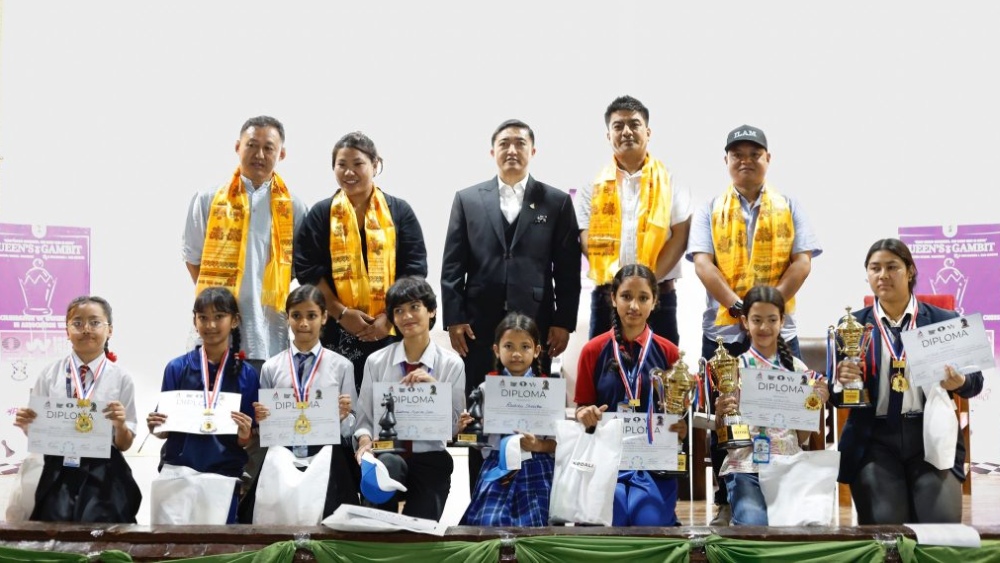
The third week of the FIDE Women’s Chess Marathon brought remarkable celebrations across Asia and Australia, showcasing both the breadth of participation and the depth of dedication that define women’s chess worldwide. From one of Nepal’s largest women’s tournaments to celebratory events in Australia, the week illustrated how chess connects and empowers girls and women across generations and continents. Nepal: A Historic Celebration of Women’s Chess In Nepal, the Himalayan Chess Academy staged one of the largest women’s and girls’ tournaments ever held in the country. Organised with the active support of Monalisha Khamboo, member of the FIDE Commission for Women’s Chess, the event brought together an impressive 142 players, aged between 5 and 67. The scale and diversity of participation made the tournament a true festival of chess, where both rising talents and experienced players found their place. After an inspiring day of competition, Precious Adhikari emerged as Champion, with Nihana Shrestha taking second place and Reshika Shrestha securing third. Prizes were awarded across multiple categories, from U-10 to veterans, underlining the inclusive nature of the event. From the youngest players like Anisma Tamang (U-10) to veterans such as Rukmani Jimi (S-50+), each participant’s achievement was recognised. Special prizes for sportsmanship, rising players, and most improved competitors highlighted the spirit of encouragement and community. The tournament also drew extraordinary support from across sports, culture, and education. Among the distinguished guests were: Palesha Goverdhan, Paris 2024 Paralympic bronze medalist Father Thomas Augustine, Principal of St. Xavier College Dipendra Lama, renowned Film Director Member Secretary of the Nepal Sports Council Dipen Rai, Senior Vice President of the Nepal Chess Federation Dinesh Maharjan, Chairman of Kathmandu Metropolitan City – 4 Surendra Kumar Rai, President of Koshi Province Chess Association Gehendra Bahadur Chand, Vice Principal of St. Xavier College This landmark tournament set a new benchmark for women’s chess in Nepal, reflecting the spirit of the Women’s Chess Marathon: inclusivity, opportunity, and the celebration of women’s potential through chess. Australia: Inspiration Across Generations In Australia, the Women’s Chess Marathon became a true celebration across schools, blending large-scale participation with inspiring role models and a remarkable coaching legacy. From a record-breaking interschool girls’ tournament to a lecture by a former World Juniors representative and a simultaneous exhibition by the country’s top female player, the week highlighted the strength of women’s chess at every level. August 12 – The Korowa Anglican Girls School CV Zonal Tournament attracted an impressive 120 girls from Prep to Grade 12, making it one of the largest interschool girls’ events in the country. The tournament showed the enthusiasm and growing talent of young Australian players, with all participants receiving official certificates from the FIDE Commission for Women’s Chess. August 19 – Former participant of Oceania Women’s Zonal tournament Andjelija Zivanovic spoke to students at Lauriston Girls School, sharing her personal journey in chess and inspiring the youngest generation, including her own daughter who now plays at the school. August 21 – WGM Julia Ryjanova, Australia’s top female player, delivered a lecture and a simultaneous exhibition against 24 students at Lauriston, impressing all with her focus and skill. The celebrations also recognised the remarkable contribution of Leonid Sandler, who has coached at Lauriston for 25 years. Global Marathon, Shared Spirit Together, the events in Nepal and Australia exemplify the essence of the FIDE Women’s Chess Marathon: creating opportunities for participation, celebrating achievements, and connecting a community of girls and women in chess – in a safe atmosphere of inspiration and growth. From record-breaking participation in Nepal to the celebration of long-term dedication in Australia, Week 3 of the Marathon highlighted the strength, diversity, and potential of women’s chess. FIDE and FIDE Commission for Women’s Chess warmly congratulate and thank the organisers, players, and supporters in both countries for their inspiring contributions. Their efforts are the key to growing chess communities of girls and women worldwide. A special thank-you goes to Monalisha Khamboo, member of the FIDE Commission for Women’s Chess and Leonid Sandler, a long-time supporter of women’s chess and a coach in our initiatives – New National Female Team & Queen’s Gambit Challenge.
Anniversary of Arpad Elo – rating system that changed chess world
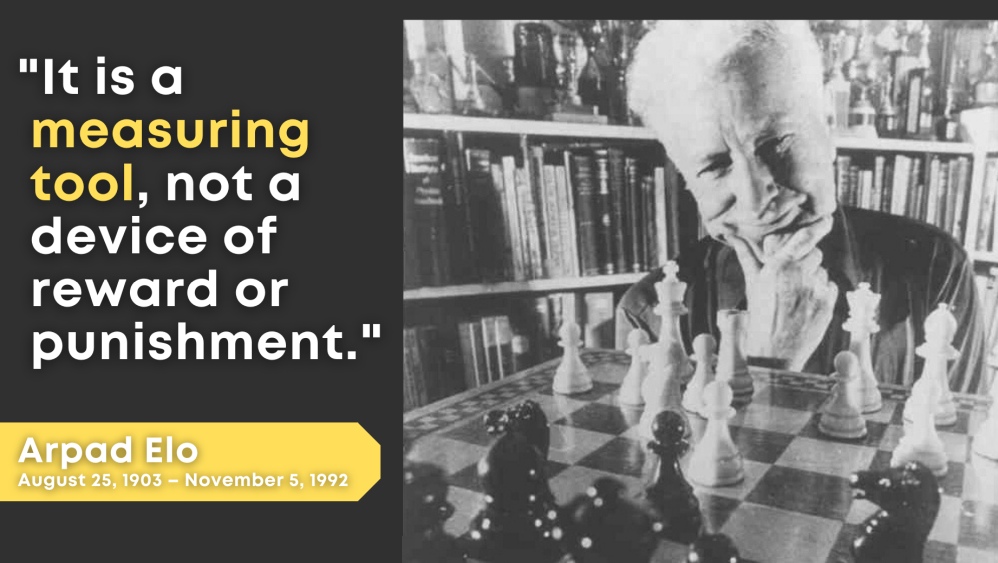
122 years ago, Arpad Emmerich Elo—a physicist, chess master, and pioneer of the rating system—was born. A native of the Kingdom of Hungary, he moved with his parents to the United States in 1913, later earning his BSc (1925) and MSc (1928) degrees from the University of Chicago. From 1926 until his retirement in 1969, Elo taught physics at Marquette University in Milwaukee. By the 1930s he was the city’s strongest chess player, at a time when Milwaukee was one of the nation’s leading chess hubs. He won the Wisconsin State Championship eight times and was the 11th person inducted into the World Chess Hall of Fame. A system for a new era The dawn of the 1970s brought a wave of technological breakthroughs. The debut of the commercial microprocessor marked a new era, and the invention of the pocket calculator in 1970 proved particularly significant for chess. It greatly simplified the work of the FIDE Qualification Commission, which had to handle a rapidly growing number of rating calculations. That same year, FIDE officially adopted Elo’s system for calculating chess ratings. Elo pioneered this rating system, which the US Chess Federation first implemented in 1960. A player’s Elo rating is a numerical measure of past performance, adjusted based on the game’s result, aligning with expected outcomes. For example, if you are rated 200 points higher than your opponent, you are expected to score about 75% of the points in head-to-head games. Meeting that expectation keeps your rating stable; exceeding it raises your rating; underperforming lowers it. Originally designed for chess, the Elo system has since been used in football, baseball, basketball, and other sports. Legacy and evolution In 1971, FIDE published its first rating list. Bobby Fischer topped it with 2760—the only player above 2700—followed by reigning World Champion Boris Spassky at 2690. Thirteen other grandmasters were above the 2600 mark. The publication frequency of the FIDE rating list has changed over time. From 1971 to 1980, only one list was issued per year. This has gradually increased to the current standard of monthly updates. Ratings have generated fascinating statistics. The highest rating ever achieved belongs to 16th World Champion Magnus Carlsen, who reached incredible heights of 2882. Only 14 other players in history have crossed the 2800 threshold. To qualify for the grandmaster title, a player must reach a rating of 2500. Today’s FIDE rating system continues to evolve, considering numerous factors to adapt to the modern game. A major 2024 update, for instance, addresses rating inflation associated with a rapidly growing base of new players, particularly children and beginners with low starting ratings.
Marc’Andria Maurizzi and Yosha Iglesias win 2025 French Championship
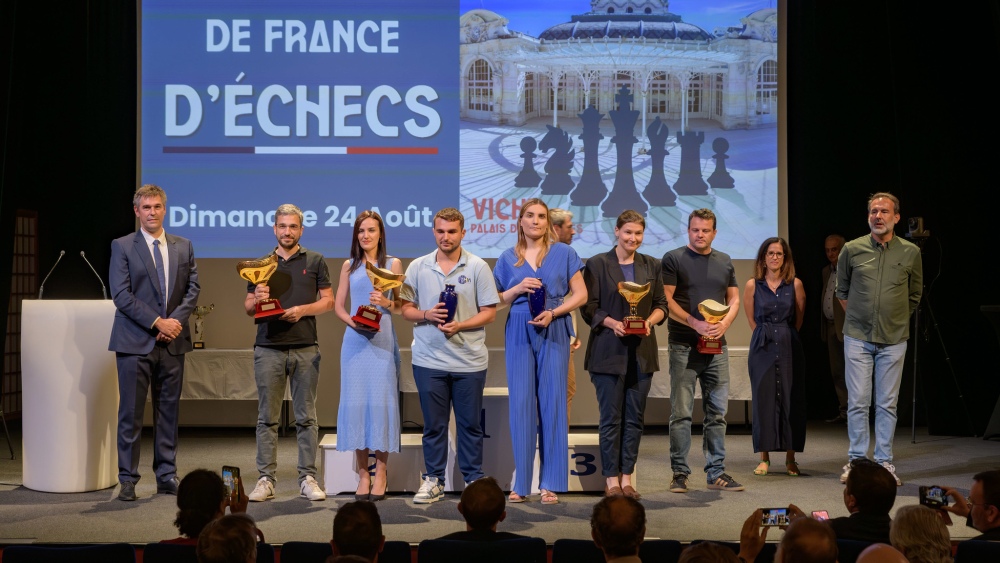
Marc’Andria Maurizzi and Yosha Iglesias are the new chess champions of France, both claiming their maiden national titles. The 2025 French Championship took place from August 15–24 in Vichy and featured 16-player knockout competitions in the open and women’s sections, as well as several side Swiss tournaments. In the main events, ties after two classical games were resolved by a 2-game rapid match (15+10), followed if necessary by a 2-game blitz (5+3) and an Armageddon (5 vs 4). The event attracted France’s top players, with the exception of Alireza Firouzja and Maxime Vachier-Lagrave, who were competing in the 2025 Sinquefield Cup. The open final pitted the youngest participant, Marc’Andria Maurizzi, against the previous year’s runner-up, Laurent Fressinet. Maurizzi confidently advanced through the Round of 16 and quarterfinals, defeating Christian Bauer and Timothé Razafindratsima, respectively. He then faced the experienced Étienne Bacrot in the semifinals, prevailing in a rapid tiebreak to secure his spot in the final. Fressinet’s path was more difficult. After defeating Marie Sebag in the Round of 16, he came close to elimination in the quarterfinals but snatched victory from Yannick Gozzoli in an Armageddon decider. His semifinal was more straightforward, as Laurent cruised past Sébastien Mazé. As many expected, the final was a tense battle. After three consecutive draws (two classical and one rapid), the 18-year-old Maurizzi took control in the fourth game and clinched the title. Bacrot secured the bronze medal by defeating Mazé. The women’s championship was equally exciting. Eventual winner Yosha Iglesias scraped through into the quarterfinals after edging out Marie Leconte but faced fewer obstacles in the later stages. In the final she played Mitra Hejazipour, who had successively eliminated Cyrielle Monpeurt, Andreea Navrotescu, and defending champion Deimantė Daulytė-Cornette. Unlike the open final, no tiebreak was needed. After a draw in the first classical game, Iglesias (pictured above) won the second to capture gold. Anastasia Savina claimed bronze by defeating Daulytė-Cornette in a tiebreak. Photos: FFE / Nathalie Daubry Official website: vichy2025.ffechecs.org/
23rd European Union Youth Championship reaches midpoint
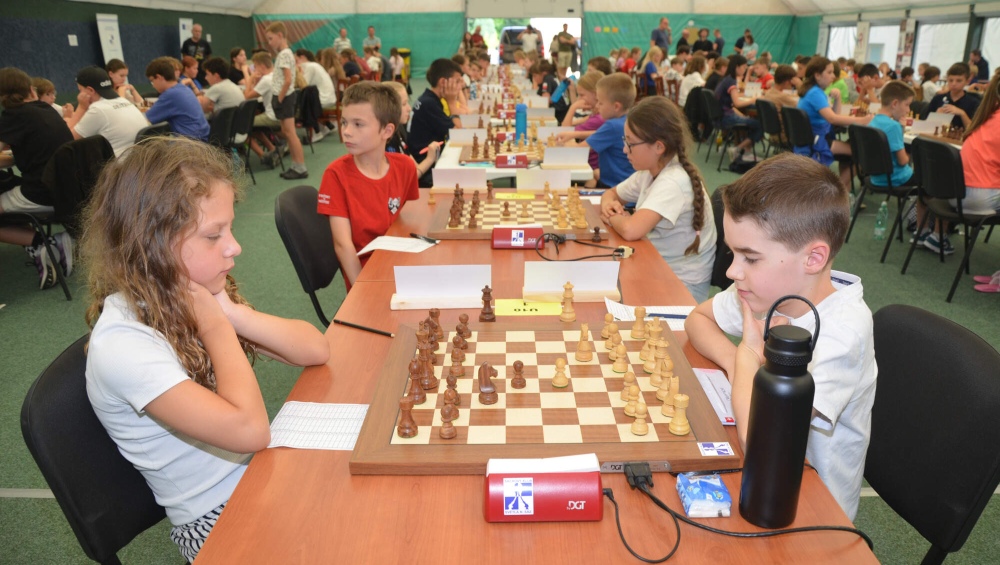
The 2025 EU Youth Chess Championship has passed the halfway mark, with participants demonstrating fierce, uncompromising chess and a very high level of play. After five exciting rounds, the category leaders are: U8: Lev Jevglevski (EST) with a perfect 5/5 U10: Simon Perouin (FRA), also with a perfect 5/5 U12: Alexandru-Daniel Pasca (ROU) with 4.5 points U14: FM Vlad Petroff (ROU) with 4.0 points To celebrate the many combative and excellent games, the organizers are awarding a daily prize for the best game in each category. So far, the following players have received a best-game prize: Wojciech Szlendak (POL), Simon Perouin (FRA), Ivan Menkov (CZE), Simon Matejka (SVK), Nicholas Josephides (CYP), Stefan Grigorescu (ROU), Nikodem Cieslar (POL), Boris Pogorelskiy (CZE), David-Christian Talaba (ROU), Thomas Lobina (FRA), Iris Hamernikova (CZE), Edward Bundan (GER), Romeo Brentegani (FRA), Pavel Hlavacek (CZE), Lukas Janovicek (SVK), Andrii Diachek (POL), Romero Antonio Landeros (CZE), Matelo Vinet (FRA), Stella Maesepp (EST), and Tobias Komarek (CZE). The additional program began on Thursday, August 21, with a simul conducted by FM Josef Kratochvil. Eighteen young championship participants, playing with 30 minutes on their clocks against the FM’s 60 minutes, achieved a surprising 11-7 victory, with time proving to be the decisive factor. A blitz tournament was held on Saturday, August 23, attracting 12 players from four countries, including EUYCC participants, coaches, and parents. FM Josef Kratochvil (CZE) won the event with 10.0/11 points, finishing ahead of Olga Debowska (POL, 9.5 points) and Anna Hrckova (CZE, 9.0 points). All winners received prizes. Beyond chess, participants are enjoying the resort’s wellness center and playground, as well as the beautiful natural surroundings. All results are available HERE Written by Zdenek Fiala, director Sachovy klub Svetla nad Sazavou Photos: Official website Official website: chess.cz/mistrovstvi-evropske-unie/
World Youth Chess Olympiad U-16 concludes in Barranquilla, Colombia
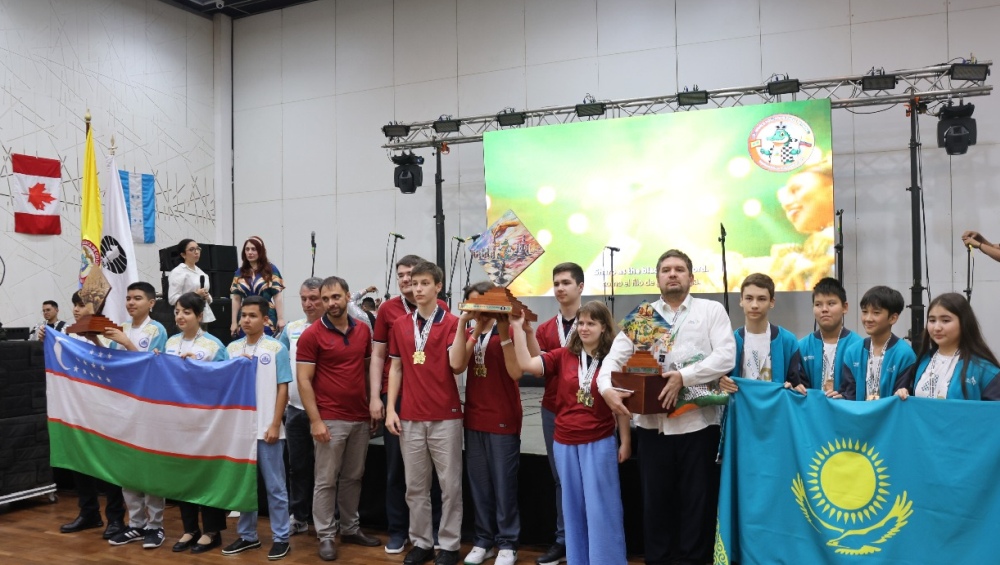
The city of Barranquilla has written a new chapter in the history of international chess. From August 16 to 23, 2025, the Colombian Caribbean capital became the heart of the chess world, hosting the U-16 World Youth Chess Olympiad—an unforgettable event that brought together more than 45 delegations from five continents. For eight days, the playing hall was filled with strategy, talent, and dreams. The ticking of clocks, the silence of concentration, and the emotions of every move transformed Barranquilla into a true temple of youth chess. Team rankings – champions crowned After nine rounds of fierce battles, camaraderie, and resilience, the final standings crowned the world’s best youth teams: FIDE 1 – Absolute Champion, with a flawless record of 9 victories in 9 rounds. Uzbekistan – Runner-up, with 7 wins and 2 draws. Kazakhstan 2 – Third place, with 7 wins and 2 losses. The top-seeded FIDE 1 team dominated the competition, securing gold with a round to spare. Uzbekistan affirmed its status as a new powerhouse of youth chess, while Kazakhstan showed that its young generation is ready to compete at the highest level. Individual brilliance – board winners The Olympiad also shone a spotlight on individual talents dominating their boards: Board 1 medalists: 1 place – GM Ivan Zemlyanskii (FIDE 1) – 7.5/9 2 place – IM Mukhammadzo Suyarov (Uzbekistan) – 7/9 3 place – IM Sauat Nurgaliyev (Kazakhstan 1) – 7/9 Board 2 medalists: 1 place – GM Savva Vetokhin (FIDE 1) – 8/9 2 place – IM Khumoyun Begmuratov (Uzbekistan) – 7/9 3 place – Matvei Savelev (FIDE 2) – 7/9 Board 3 medalists: 1 place – GM Artem Uskov (FIDE 1) – 8/9 2 place – FM Alan Petukhov (Kazakhstan 1) – 8/9 3 place – IM A.R. Ilamparthi (India) – 7/8 Board 4 medalists: 1 place – CM Prathamesh Sherla (India) – 8/9 2 place – WIM Jinela Rodríguez Rivero (Cuba 1) – 8/9 3 place – WGM Anna Shukhman (FIDE 1) – 7/9 The Olympiad was more than a sporting competition—it was a celebration of diversity, unity, and cultural exchange. Players of different languages, religions, and traditions sat across from one another, proving that on the 64 squares, everyone speaks the same language: the language of chess. Barranquilla, with its warmth and hospitality, embraced every delegation as family. It became a place where new friendships were born, dreams were nurtured, and the spirit of fair play shone brightly. Closing ceremony to remember The closing ceremony blended sport, art, and culture in an unforgettable evening. Champions were honored in the presence of distinguished guests, including: Daniel Trujillo, Secretary of Sports, Mayor’s Office of Barranquilla Akaki Iashvili, FIDE Special Tasks Director Weymar Fernando Muñoz, President of the Colombian Chess Federation Erick Hernández, representative of the Chess Confederation of the Americas (CCA) Eduardo de la Rosa, Governor of Atlántico The legendary Banda de Baranoa brought the evening to life with vibrant rhythms and a spectacular performance that filled the hall with joy, music, and color. Delegations clapped, danced, and celebrated together, closing the Olympiad not as rivals, but as one global family. The Colombian Chess Federation expresses its deep gratitude to all delegations, federations, organizers, and sponsors who made this world-class event possible. Thanks to their commitment, Colombia has shown itself not only as a chess-loving nation, but also as a country capable of hosting events of global excellence. This Olympiad produced more than champions—it created memories, friendships, and inspiration. It proved that chess is not confined to the board: it is a school of life, a bridge between cultures, and a path toward a brighter future for youth. Barranquilla bids farewell with pride and joy, crowned the World Capital of Youth Chess 2025. The pieces are now at rest, but the spirit of this Olympiad will remain alive in every child who dared to dream, compete, and win—not just on the board, but in life. Photos: Federación Colombiana de Ajedrez Official website: youtholympiad2025.fide.com/
Future of chess and clash of generations at Grand Swiss 2025 in Samarkand
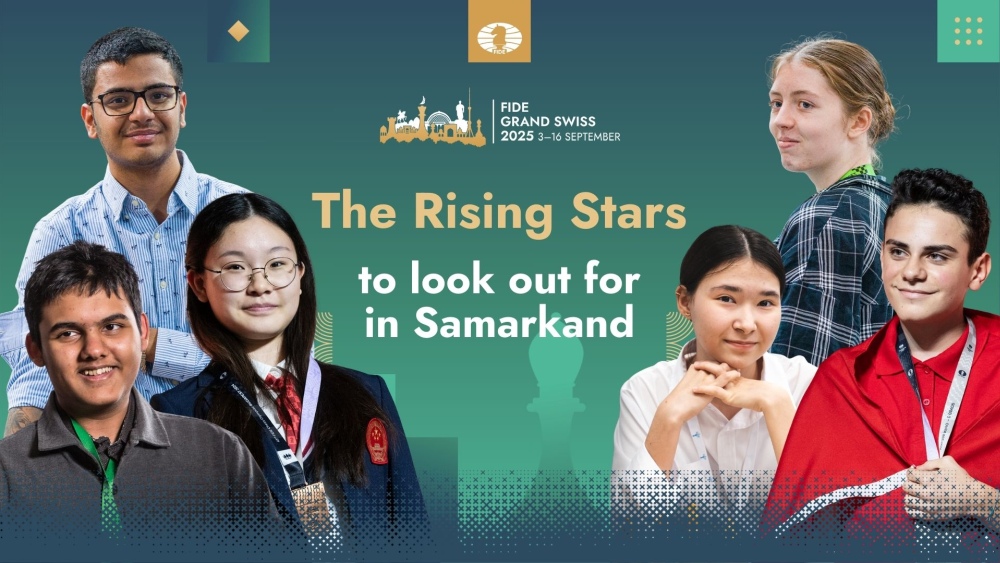
While the eyes of the chess world are usually on the favourites, a new generation of players is coming up through the ranks and they will be looking to shake things up at the Grand Swiss in Samarkand. The fourth edition of the strongest ever Swiss System tournament in chess – the FIDE Grand Swiss – is set to take place in Samarkand, Uzbekistan at the start of September. Many of the best players in the world will be there, competing in one of the most prestigious events on the chess calendar. Among them, a cohort of prodigious youngsters in their early teens, brought up to become chess champions and set new world records for the ancient game. While many of them are already widely known, some are yet to stand out on the global chess scene. The lowering age of success bar in chess In 1958, when Bobby Fischer became a Grandmaster at 15 years and six months—already the U.S. Champion at the time—it made headlines around the world. The New York Times reported that this made Fischer a member of the “most exclusive chess fraternity in the world”. As years went by, the age bar continued to go lower: Judit Polgar beat Fischer’s record by two months in 1991, also becoming the first woman to set the new record; then came Ruslan Ponomariov at 14 years and 17 days; Karjakin followed at 12 and seven months; and then in 2021 Abhimanyu Mishra set the current record at 12 years and four months. In nearly 50 years, the threshold has dropped from 15 to just 12. But there are also other records set by youngsters. Turkiye’s Yagız Kaan Erdogmuş became the youngest-ever player to surpass a 2600 rating in 2024, before turning 13. And, of course, the crown of success – Gukesh D became the World Champion at the age of just 18, having previously become the youngest player ever (at the age of just 17) to cross the FIDE rating of 2750. Most recently, Britain’s Bodhana Sivanandan (10) became the youngest girl ever to defeat a Grandmaster and achieve the WIM title. Also, in the United States, 10-year-old Keya Iha defeated a GM in the final round of the Joe Yun Memorial. With the age of mastery and success dropping with every generation, chess is clearly becoming a young person’s game. Early starts, more family and state support, dedication and planning, as well as computers – are to credit for this trend. The forthcoming Grand Swiss in Samarkand is the next battleground where the youthful energy will test and be tested by experience, and the clash of generations will bring new surprises to the chess world. The rising stars to look out for in Samarkand The Open Volodar Murzin (2678) Photo: Michal Walusza Born in 2006 in Nizhny Tagil, Murzin’s became a Grandmaster in 2022, just five years since becoming a FIDE Master. He caught global attention last December when he won the World Rapid Championship in New York with 10/13, defeating seasoned players such as Caruana, Nakamura and Duda. The 19-year-old is currently ranked 46th in the world. Raunak Sadhwani (2676) Photo: Michal Walusza The Indian prodigy has for years been present at the top of the chess world that it’s easy to overlook the fact that he is just 19. The youngster from Nagpur in India became a GM at the age of 13. He won the Commonwealth Championship in the U-10 group in 2015 and was part of India’s bronze team at the 44th Chess Olympiad. A confident and polite player, Sadhwani is a regular at world-class events, always lurking around the top. Jonas Buhl Bjerre (2655) Photo: Maria Emelianova The 21-year-old Danish GM is gradually making his way to the top of the chess world. His greatest successes so far include winning the gold medal at the 2017 European Youth Chess Championships and finishing third at the Tata Steel Chess Tournament 2022 Challengers group. A versatile player, he has several strong tournaments under his belt and has played almost every top player in the world in recent years. Ediz Gürel (2652) Photo: Mark Livshitz The second youngest Turkish GM (at just 14), Gurel has caught the attention of the chess world on several recent occasions. In 2024, he won the Challengers section of the Prague Chess Festival without a single loss, and his ELO has had a steady upward rise in recent years. With a rating of 2652 at just 16 years of age, Gürel is a player whose star is rapidly ascending. Yağız Kaan Erdoğmuş (2642) Photo: Michal Walusza Even though he’s only 14, Erdoğmuş already has two spectacular records under his belt: in 2024 he became a GM at the age of 12 years and 10 months (the fourth youngest ever), while that same year he became the youngest player to cross the 2600 ELO mark. With appearances at several notable tournaments (Sitges, Grenke, TePe Sigeman) he is on a fast track to becoming one of the top players in the world. This July, he beat Peter Svidler 4–2 in the “Clash of Generations” match, a result that propelled him into the world’s Top 100, the second-youngest ever after Judit Polgar. Abhimanyu Mishra (2610) Photo: Anna Shtourman Another record-setter, Mishra is the youngest person ever to become Grandmaster. He was awarded the title in 2021, at the age of 12 years, four months and 25 days. His previous record was to become the youngest International Master ever (10 years and nine months). Most recently, he finished in shared 2-3rd place in the US Juniors Championship. Mishra is yet to achieve a grand success in a big international tournament, and he will be looking for a chance at the Grand Swiss in Samarkand. Marc’Andria Maurizzi (2604) Photo: Michal Walusza Another youngster, 18-year-old Maurizzi became the youngest French GM in 2021, at the age of 14. Two years before, in 2019, he won the French junior championship for players under 12 years old.
23rd EU Youth Championship begins in Roznov pod Radhostem, Czech Republic
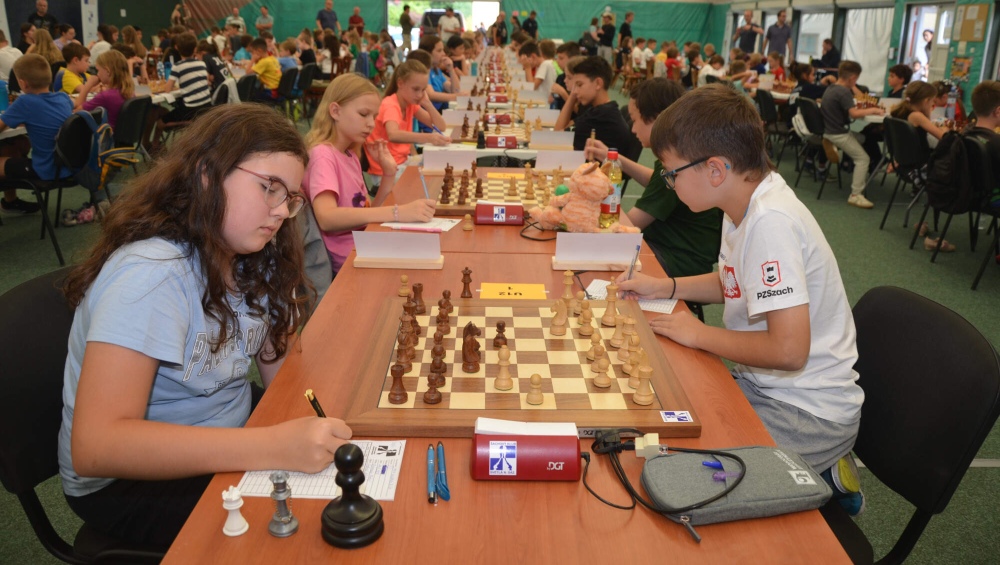
On Tuesday, August 19, the 23rd European Union Youth Chess Championship (U8, U10, U12, U14) began at the Hotel Energetic in Rožnov pod Radhoštěm, Czech Republic. Following the success of previous editions, the 2025 European Union Youth Chess Championship is once again organized under the patronage of the European Chess Union by Šachový klub Světlá nad Sázavou in cooperation with the Czech Chess Federation, with support from the Zlín Region. Boys and girls in each age group compete together in a nine-round Swiss tournament with classical time control but are ranked separately. All games are being broadcast live online. The 2025 edition has set a new participation record, with 127 players from 16 ECU federations. The top-seeded player is Poland’s Andrii Diachek (2223), who leads the U14 category. The top-seeded girl is also from Poland, Lila Rząd kowska (1964), headlining the U12 girls’ section. For parents and chess fans, the organizers have prepared a variety of chess and non-chess activities. Participants can also take advantage of the hotel’s facilities for relaxation and recreation. Rožnov and its mountainous surroundings are well known for sports opportunities, and many players will enjoy visiting the Wallachian Open Air Museum—the largest of its kind in Central Europe. On Wednesday, August 27, eight new EU champions will be crowned. The winners in each category will receive laptops, while the second- and third-place finishers will be awarded digital chess clocks. All participants will receive diplomas, medals, and a T-shirt featuring the championship logo. Written by Zdenek Fiala, director Sachovy klub Svetla nad Sazavou Photos: Official website Official website: chess.cz/mistrovstvi-evropske-unie/ All results are available HERE Live broadcast: HTML: U14, U12, U10, U8 Lichess: U14, U12, U10, U8, All
Asian and Americas Chess Federations sign Memorandum of Understanding
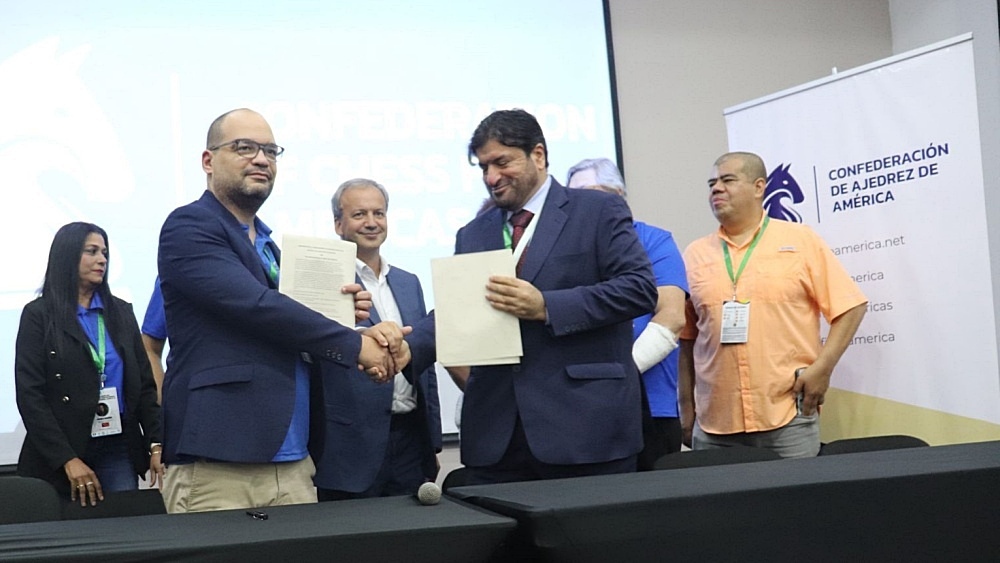
The Asian Chess Federation and the Confederation of Chess for the Americas have signed a Memorandum of Understanding to strengthen collaboration in the field of chess activities. The agreement was signed on August 18, 2025, in Barranquilla, Colombia, by President of the Confederation of Chess for the Americas Jose Carrillo Pujol, and General Secretary of the Asian Chess Federation Hisham Al Taher. The Memorandum sets out a framework for joint initiatives in player training, coach education, exchange programs, research, and the promotion of chess among young people. Both federations will work together to develop school chess projects, youth festivals, and professional training opportunities, while also sharing expertise in curriculum design, sports management, and infrastructure. Speaking at the signing ceremony, FIDE President Arkady Dvorkovich underlined the importance of this collaboration: “I always thought from the start of my service that this horizontal type of collaboration is critically important. It is not that it can be done top to the bottom. There should be activities and initiatives both planned and implemented at the horizontal level between individual federations, between zone federations, and between continental federations…I am happy to see that you are signing this agreement and I look forward to the results.” Under the agreement, each side will facilitate exchanges of players, coaches, officials, and administrators, as well as cooperate on the creation of teaching materials and development programs. The two federations also plan to collaborate on research and innovation in chess training and education. The Memorandum will remain in effect for three years, with the possibility of renewal.
World Youth Chess Olympiad U-16: Multiple leaders after two rounds
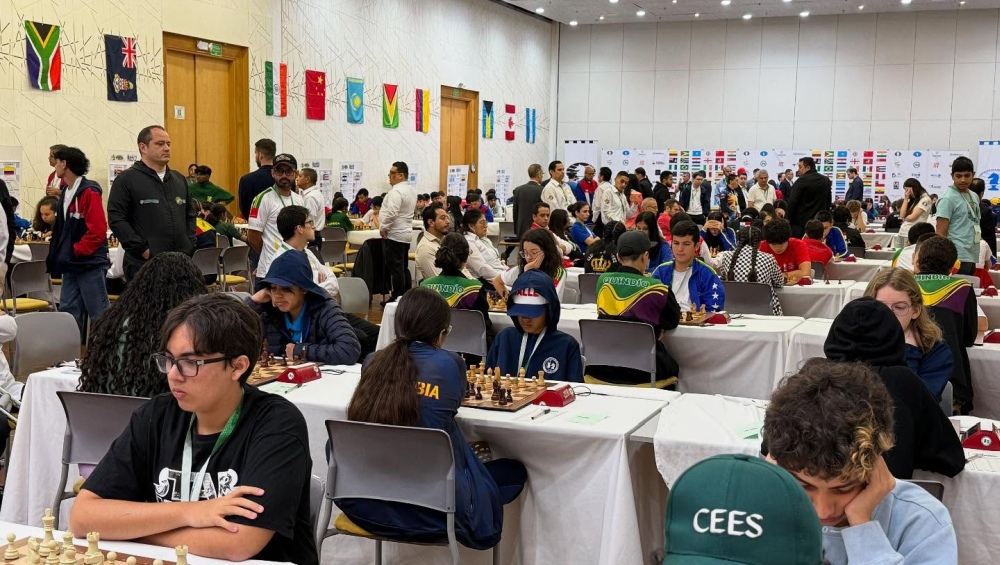
The city of Barranquilla is buzzing with excitement as it hosts the World Youth Chess Olympiad U-16, bringing together teams from more than 45 countries. After the second round, the standings are beginning to reveal the teams showing the strongest performances in this prestigious event. Round 2 highlights After two rounds of play, several teams are leading the standings: Kazakhstan 1 and Kazakhstan 2, demonstrating remarkable consistency across all boards. Georgia and Canada, who continue their winning streak with back-to-back victories. India, FIDE 1, FIDE 2, Cuba 1, Cuba 2, China, Uzbekistan, Paraguay, Peru 1 and four Colombian teams all completing the group of undefeated teams with excellent results. All of these squads have scored two victories in their opening matches, achieving a perfect 4/4. Featured match One of the most talked-about games of the day was the clash between Woman Grandmaster (WGM) Anna Shukman (FIDE) and Peruvian rising star Achatada Mandujano. The duel was fiercely contested and ended in a draw, showcasing the high level of competition. Latin American and Colombian presence The Colombian teams have delivered noteworthy performances, with several squads positioned in the upper half of the standings. Colombia 1, Colombia 2, Colombia 7, and Colombia 13 have all posted solid results, keeping their hopes alive against delegations with strong international reputations. In addition, teams from Paraguay, Peru, Brazil, and Cuba, along with Italy, have scored valuable points to remain competitive in the tournament. Inspiring event The Olympiad is not only a sporting competition but also a cultural and social gathering, strengthening bonds of friendship among nations. Barranquilla is consolidating its place as a global hub of youth chess, hosting some of the brightest talents of the next generation. With every round, anticipation builds over which country will emerge victorious—where the talent, discipline, and passion of young chess players take center stage. FIDE President Arkady Dvorkovich attended the event and made the first ceremonial move in the match between Georgia and the FIDE teams. “I hope at some point we will have the Chess Olympiad in the Americas—not U-16, but the main one. It is our ambition for the future. It is not an easy task, but it is achievable. Having more events here allows local players to improve their skills and gain valuable experience. This competition offers a great opportunity for the younger generation to grow, not only from ‘traditional’ chess countries but also from smaller ones in the Caribbean region. It is a very good sign.” Live Broadcast Renowned Grandmaster and commentator Pepe Cuenca is leading the live coverage of the games, bringing his dynamic and charismatic style that has become a hallmark in the chess world. Fans can follow the most exciting matches with live commentary on the YouTube channel of the Colombian Chess Federation (FECODAZ). All updated results are available HERE. Photos: Federación Colombiana de Ajedrez Official website: youtholympiad2025.fide.com/

